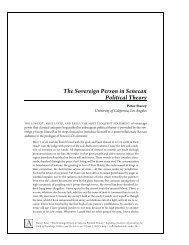Deceit, Desire, and the Literature Professor: Why Girardians Exist
Deceit, Desire, and the Literature Professor: Why Girardians Exist
Deceit, Desire, and the Literature Professor: Why Girardians Exist
Create successful ePaper yourself
Turn your PDF publications into a flip-book with our unique Google optimized e-Paper software.
LANDY | DECEIT, DESIRE, AND THE LITERATURE PROFESSOR: WHY GIRARDIANS EXIST 15<br />
firms it, just as long as you ignore <strong>the</strong> fact that God is driving <strong>the</strong> action. 53 (In <strong>the</strong> words of <strong>the</strong><br />
song, “it ain’t necessarily so.”)<br />
Actually, <strong>the</strong> first chapters of Genesis need a little more work to get <strong>the</strong>m to fit <strong>the</strong> Girardian<br />
<strong>the</strong>ory, <strong>and</strong> that brings us to our third reading error. 54 It’s not enough to take God out of <strong>the</strong><br />
picture; we still need Adam’s exile to be <strong>the</strong> result of a collective human decision, following an<br />
“escalation of mimetic rivalry.” So let’s move Adam out of Eden <strong>and</strong> into a larger human community.<br />
Fur<strong>the</strong>r, let’s create discord in this community. What evidence do we have for this?<br />
<strong>Why</strong>, <strong>the</strong> tohu-va-vohu, <strong>the</strong> primal chaos out of which God created <strong>the</strong> world. As long as we read<br />
that tohu-va-vohu allegorically (it’s not just <strong>the</strong> shapeless mass of matter preceding creation, it’s<br />
“<strong>the</strong> undifferentiated reciprocity of mimetic conflict” 55 ), <strong>and</strong> as long as we move it from <strong>the</strong> beginning<br />
of time to some point in <strong>the</strong> Pleistocene era, everything works out. This, <strong>the</strong>n, is our<br />
third reading error: <strong>the</strong> error of resequencing, of rearranging <strong>the</strong> order of events as is most convenient<br />
for a given interpretation. 56 So <strong>the</strong> tohu-va-vohu is not a cosmic chaos but a fully human<br />
disorder; it takes place not at <strong>the</strong> beginning of time but billions of years later; Adam is not exiled<br />
from a garden with two people in it but from a substantial community; Adam is not guilty of anything<br />
but is pure as <strong>the</strong> driven snow; yet in every o<strong>the</strong>r way, this is a historical reporting of something<br />
that actually happened. As Mark Twain is supposed to have said, never let <strong>the</strong> facts get in<br />
<strong>the</strong> way of a good story.<br />
A beautiful twist on this strategy, which we should count as a fourth type of reading error,<br />
consists in <strong>the</strong> paradoxical celebration of defeat. When a myth does <strong>the</strong> exact opposite of what<br />
it’s supposed to—as <strong>the</strong> Oedipus myth does, by making its protagonist someone who deserves<br />
his exile—Girard comes right out <strong>and</strong> claims that this is even more reason to take it as supporting<br />
his view. 57 After all, he says, myths have to conceal <strong>the</strong> truth in order to function; so of course<br />
<strong>the</strong>y do not support his <strong>the</strong>ory. This is a stunningly brazen thing to say in itself (on those<br />
grounds, I can prove that <strong>the</strong> Oedipus story is really about chickens). But it’s also one that you<br />
might think runs into a bit of a problem given <strong>the</strong> way in which Girard treats biblical stories.<br />
These stories (that of Joseph <strong>and</strong> his bro<strong>the</strong>rs, for example) somehow do manage to tell <strong>the</strong><br />
53 Among so many tendentious readings (which one should perhaps call rewritings), Girard’s account of <strong>the</strong> Jonah<br />
story is arguably <strong>the</strong> most stupefying of all. “The ship,” he says, “represents <strong>the</strong> community, <strong>the</strong> tempest <strong>the</strong> sacrificial<br />
crisis. The jettisoned cargo is <strong>the</strong> cultural system that has ab<strong>and</strong>oned its distinctions. The fact that everybody calls out<br />
to his own particular god indicates a breakdown in <strong>the</strong> religious order” (VS, 313). If <strong>the</strong> ship represents <strong>the</strong><br />
community, what does <strong>the</strong> actual community (<strong>the</strong> Jews of Nineveh) represent? <strong>Why</strong> do we need an additional<br />
explanation for <strong>the</strong> fact that people from different regions have different gods (as we see throughout <strong>the</strong> Old<br />
Testament)? And why ignore <strong>the</strong> fact that <strong>the</strong> storm is God’s punishment? Reading this is like reading Augustine on<br />
<strong>the</strong> parable of <strong>the</strong> Good Samaritan: <strong>the</strong> man, says Augustine, is Adam; going down from Jerusalem means falling from<br />
Eden; <strong>the</strong> robbers who set upon him are <strong>the</strong> Devil <strong>and</strong> his minions; <strong>the</strong> Samaritan is Jesus; <strong>the</strong> inn is <strong>the</strong> Church; <strong>the</strong><br />
innkeeper is Paul; <strong>and</strong> so on, <strong>and</strong> so on. By <strong>the</strong> twentieth century, serious <strong>the</strong>ologians were no longer indulging in<br />
such unconstrained, essentially arbitrary interpretations. But Girard is still flying <strong>the</strong> flag, <strong>and</strong> his out-of-control<br />
allegoresis is on full display not just here but in his analysis of Satan (TH, 162), whom he characterizes as<br />
simultaneously <strong>the</strong> mimetic model, <strong>the</strong> mimetic process, <strong>and</strong> <strong>the</strong> founding mechanism, all at once.<br />
54 As Girard himself admits, “in <strong>the</strong> story of <strong>the</strong> creation of <strong>the</strong> world, <strong>the</strong> founding moment comes at <strong>the</strong> beginning<br />
<strong>and</strong> no victimage is involved” (TH, 143).<br />
55 See “MV,” 10, for <strong>the</strong> phrase <strong>and</strong> TH, 142, for application to <strong>the</strong> tohu-va-vohu.<br />
56 Girard erects this into a general principle of interpretation: <strong>the</strong> “<strong>the</strong>me of disorder,” he says, “does not always come<br />
first since it is seen as a consequence of <strong>the</strong> scapegoat’s misdeed” (“PTW,” 151).<br />
57 “The Oedipus myth does not tell us Oedipus is a mimetic scapegoat. Far from disproving my <strong>the</strong>ory, this silence<br />
confirms it” (“MV,” 15). “Myths, <strong>the</strong>y would say, are not about scapegoating because <strong>the</strong>y don’t talk about it. But<br />
that’s just <strong>the</strong> point: <strong>the</strong>y don’t talk about it; <strong>the</strong>y disguise <strong>the</strong>ir generative center” (“AC,” 267).



